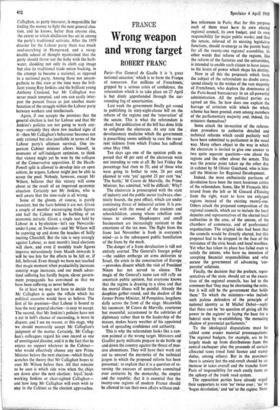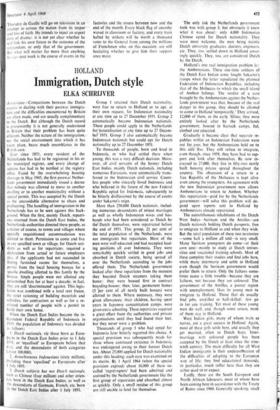Wrong weapon and wrong target
FRANCE ROBERT FRANC
Paris—For General de Gaulle it is 'a great of tomorrow. For millions of Frenchmen,' national occasion,' which is to form the Frew,: gripped by a serious crisis of confidence, the referendum which is to take place on 27 April is but dimly apprehended through the sur- rounding fog of uncertainties.
Last week the government finally got round to publishing its sixty-eight-clause bill on the reform of the regions and the 'renovation' of the senate. This is what the referendum is about; but publication of the bill has done little to enlighten the electorate. At any rate the devolutionary medicine which the government is prescribing seems unlikely to cure the recur- rent sickness from which France has suffered since May 1968.
Ten days ago one of the opinion polls re- ported that 48 per cent of the electorate were not intending to vote at all. By last Friday the percentage had risen to 53; and of those who were going to bother to vote, 24 per cent planned to vote 'yes' against 23 per cent 'no,' The battle,' M Couve de Murville, the Prime Minister, has admitted, 'will be difficult.' Why?
The electorate is preoccupied with the state of industry and the public sector (railways, elec- r, tricity boards, the post office), which are under continuing threat of industrial action. It is pre- occupied with the mood of the students and schoolchildren, among whom rebellion con- tinues to simmer. Shopkeepers and small businessmen are increasingly resistant to the extortions of the tax men. The flight from the franc last November is fresh in everyone's mind—as is the subsequent public humiliation of the franc by the mark.
The danger of a franc devaluation is still not entirely averted. The General's foreign policy —the sudden embargo on arms deliveries to Israel, the crisis in the construction of Europe. —provokes dissent which the visit of President - Nixon has not served to silence. The magic of the General's name can still rally an uncertain public opinion, but everyone knows that the regime is drawing to a close and that the mortal illness will be painful. Already the dauphins gather-round, and the shadow of the former Prime Minister, M Pompidou, lengthens daily across the front of the stage. Meanwhile his successor, M Couve de Murville, courteous but mournful, accustomed to the subtleties of diplomacy rather than to the leadership of the masses, makes heavy weather of his appointed task of spreading confidence and authority.
This is why the referendum looks like a can- non pointed at the wrong target. Ministers and Gaullist party militants prepare to do battle up and down the country against the threat of mas- sive abstentions. They will have their work cut out to unravel the mysteries of the technical jargon in which the proposed reform has been presented : to explain_ that it is a question of re- versing the excesses of centralism committed over centuries by the monarchy, the empire and the republic; that it is essential that the twenty-one regions of modern France should be allowed to run their-own affairs without end- less references to Paris; that for this purpose each of them must have its own elected regional council, its own budget, and its own responsibility for major public works; and.that the senate, relieved of its existing legislative functions, should re-emerge as the parent body for all the twenty-one regional assemblies. In other words that reform of the regions, like the reform of the factories and the universities, is intended to enable each citizen to have access to the levers of power which shape his destiny. Now in all this the proposals which form the subject of the referendum no doubt corre- spond closely to the wishes of the vast majority of Frenchmen, who deplore the dominance of the Paris-based bureaucracy in an all-powerful administration. All the political parties are agreed on this. So how does one explain the barrage of criticism with which the whole scheme has been greeted, even among members of the parliamentary majority and, indeed, the ministers themselves?
Some attack the invocation of the referen- dum procedure to authorise detailed and technical reforms which could perfectly well have been submitted to parliament in the usual way. Many others object to the way in which the electorate is invited to give one answer to two quite separate questions—one about the regions and the other about the senate. This was the precise point taken up the other day in cabinet by M Olivier Guichard, who is him- self the Minister for Regional Development.
Indeed, the most enthusiastic partisans of devolution have been the most ferocious critics of the referendum. Some, like M Francois Mit- terand from the left or M Giscard d'Estaing from the right, want to have ten enlarged regions instead of the existing twenty-one. Others attack the proposed composition of the regional councils, which are to include the local deputies and representatives of the elected local authorities in the area, of the unions, of the chambers of commerce, and of professional organisations. The original idea had been that the councils would be directly elected, but this proposal had to be dropped in the face of the resistance of the civic heads and local worthies. Yet what has taken its place has failed even to satisfy the unions, who have no intention of accepting financial responsibilities and who accuse the government of advancing 'cor- poratist' solutions.
Finally, the decision that the prefects, repre- sentatives of the state, should act as the execu- tives of the regional councils, has led to the comment that 'they may be shortening the reins, but it will still be the government that holds them.' To which the ministers—who ineJude such jealous defenders of the principle of national identity as M Michel Debit—reply that there can be `no question of giving all the power to the regions' or laying the base for a federal state by re-establishing 'the menacing shadow of provincial parliaments.'
To the ideological disputations must be added some cruder material preoccupations. The regional budgets, for example, are to be largely made up from distributions from the central exchequer plus the proceeds of certain allocated taxes (road fund licence and stamp duties, among others). But in the provinces there is anxiety lest the end-result should be an increase in taxes overall and the transfer from Paris of responsibility for such costly items as the upkeep of the trunk road system.
The opposition parties haver already urged their supporters to vote `no' twice over: `no' to 'bogus devolution,' and `no' to the regime. Next Thursday de Gaulle will go on television in an attempt to-arouse the nation from its torpor and loss of faith. He intends to inject an urgent note of drama: it is not yet clear whether he will link his own future to the outcome of the referendum, or only that of the government. But what will matter far more than anything he 'says next week is the course of events in the factories and the streets between now and the end of the month. Every black flag of anarchy waved in classroom or factory, and every train halted by strikers will be worth a thousand votes to the General from among the millions of Frenchmen who, on this occasion, are still hesitating whether to give him their support once more.



































 Previous page
Previous page